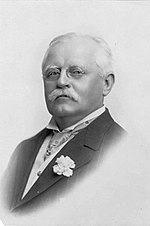Julian Carr (industrialist), Date of Birth, Place of Birth, Date of Death
TweetJulian Carr (industrialist)
American philanthropist
 Date of Birth: 12-Oct-1845
Date of Birth: 12-Oct-1845
 Place of Birth: Chapel Hill, North Carolina, United States
Place of Birth: Chapel Hill, North Carolina, United States
Date of Death: 29-Apr-1924
Profession: banker, suffragist
Nationality: United States
Zodiac Sign: Libra 
About Julian Carr (industrialist)
- Julian Shakespeare Carr (October 12, 1845 – April 29, 1924) was a North Carolina industrialist, philanthropist, white supremacist, and Ku Klux Klan supporter (and when young, a pro-slavery advocate).
- He was married to Nannie Carr, with whom he had two daughters (including Eliza Carr) and three sons. Carr was the son of Chapel Hill merchant and slaveowner John Wesley Carr and Eliza P.
- Carr (née Eliza Pannell Bullock), and entered the University of North Carolina (today the University of North Carolina at Chapel Hill) at 16, in 1862.
- His studies were interrupted in 1864 by service as a private in the Confederacy, serving with the Third North Carolina Cavalry.
- Later in life, he was known as "General Carr," the unofficial rank having been bestowed by the state veterans' association due to his long service in veterans' affairs and generosity toward widows and their children.
- Carr also supported white supremacy and the Ku Klux Klan, spoke favorably of the murder of African Americans that occurred during the Wilmington Massacre of 1898, which he called a "grand and glorious event", and celebrated lynchings.
- In 1923, UNC bestowed an honorary degree upon Julian Carr.After the war, Carr became a partner in the tobacco manufacturing firm W.
- T.
- Blackwell and Co.
- in nearby Durham.
- His business acumen led to the firm's becoming known worldwide through its recognizable Bull Durham trademark.
- Carr became one of the state's wealthiest individuals, engaging in successful textile, banking (Durham's First National Bank), railroad, public utility (Electric Lighting Company), and newspaper endeavors.
Read more at Wikipedia
See Also
- Famous People's Birthdays on 12 October, United States
- Famous People's Birthdays in October, United States
- Famous banker's Birthdays on 12 October, United States
- Famous banker's Birthdays in October, United States
- Famous suffragist's Birthdays on 12 October, United States
- Famous suffragist's Birthdays in October, United States

